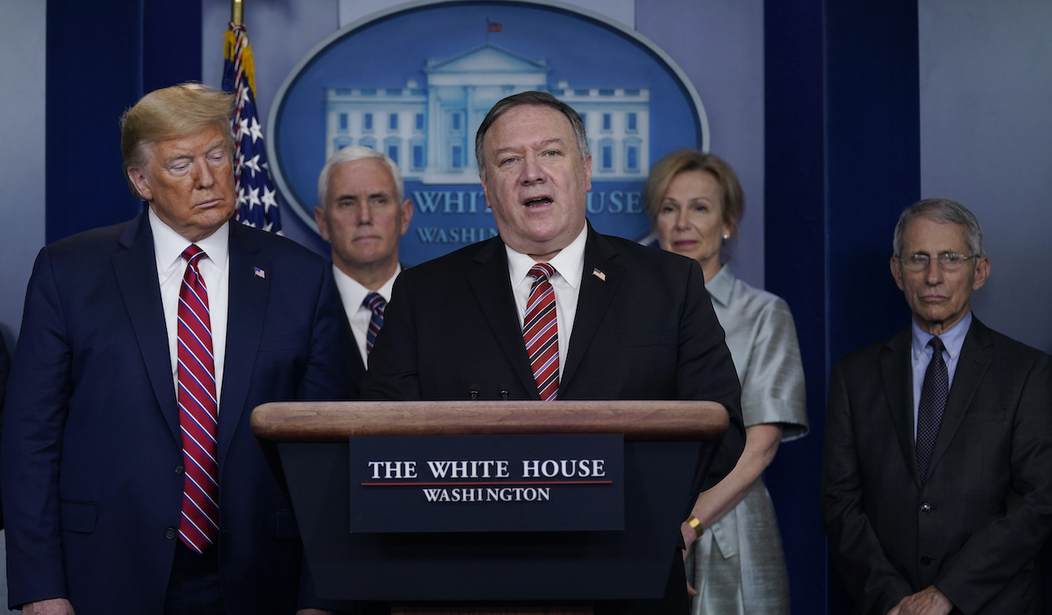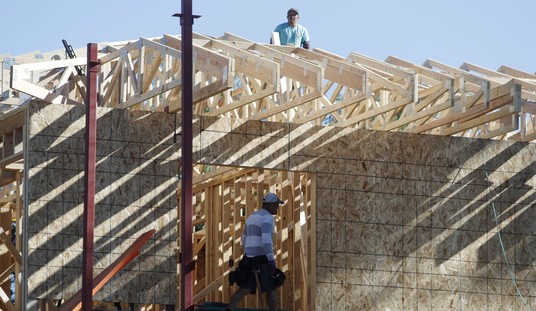The ChiComs were downright gleeful on Wednesday when it appeared that President Trump had backed off on calling the Chinese plague the “China virus.” They immediately trumpeted a post on the Chinese Communist Party-controlled Global Times with this headline: “Trump drops racist virus term after backlash.”
By stopping calling the novel coronavirus “Chinese virus,” US President Donald Trump has again exposed his weakness of being extremely inconsistent on China-related rhetoric particularly when he has been under tremendous pressure following an incompetent response to the outbreak in the US. Such an abrupt shift, however, won’t change long-term fundamentals of China-US ties. Especially after a rare spat between diplomats from the two sides, which has intensified the rivalry and ideological antagonism, comprehensive cooperation on combating the pandemic appear unlikely, analysts said.
That’s one way of putting it, ChiComs. The “comprehensive cooperation” you seek is being purposely thwarted by the CCP’s reluctance to be truthful and forthcoming about the origins of the virus, without which cooperation and developing solutions won’t happen.
But their interpretation of the President’s remarks was wrong, just as the Democrat-media complex’s interpretation of the President’s public statements and Twitter tweets is frequently (if not always) clouded by the same ideology as the ChiComs’!
I mean, does anyone seriously think that Secretary of State Mike Pompeo somehow didn’t get the message of a policy change in naming the virus? That’s because there wasn’t one. Here are his remarks in a Q&A session with Hugh Hewitt on Thursday:
QUESTION: Welcome back, America. It’s Hugh Hewitt, the Mandalorian of the radio, joined by United States Secretary of State Michael Pompeo. Good morning, Mr. Secretary. How are you and your family?
SECRETARY POMPEO: We’re all good, Hugh. I hope your family is good, too. It’s great to be with you this morning.
QUESTION: Neither can I. Let me move to China. Can you confirm the report that the G7 disagrees with you over your belief we ought to call this the Wuhan virus?
SECRETARY POMPEO: So different countries take different approaches. I will say this: I was actually pleased yesterday. The EU countries that are part of the G7 made very clear, as did my Japanese counterpart, that the Chinese disinformation campaign that the Chinese are actively engaged in even as we speak, trying to defer blame, trying to claim that they are the solution to this and in fact they weren’t the nation that, at the very beginning of this, had the – one country that had the opportunity and the data set that could have put this virus in a much better place than we are today and failed to do so. The G7 countries yesterday were unanimous in saying we understand that this is a risk, that this is a problem both to the EU and to the United States and the world, and they agreed to jointly work alongside us to push back against this disinformation campaign.
QUESTION: But on a name they cannot agree?
SECRETARY POMPEO: Everybody’s got a different theory. My theory is we should always be accurate with respect to how we identify something. This virus began in Wuhan; I’ve referred to it as the Wuhan virus. It is important that the world understands how this began because we need transparency to save lives, Hugh. It’s that simple. We need facts and data. China has a special responsibility to be transparent because the outbreak started in China, in Wuhan, and the Chinese Government was the first to know about it.
QUESTION: Does General Secretary Xi owe the world an apology and an explanation?
SECRETARY POMPEO: I’ll leave that to him. What I can tell you are the facts. You’ll recall, Hugh, that at the very onset of this, when America first learned about this, we did our best to make sure that we had transparency and information. We offered to send our expert medical providers in. We offered to make sure that we could provide whatever support they needed. And instead of cracking down on the virus in a timely fashion, they cracked down on information flow. They kicked journalists out. They punished those who were speaking about this inside of their own country. When you have challenges, when you have crises like this one, the most important thing at the onset is to make sure that the world gets access to the data that they need to prevent this, to prevent the spread of this, and the Chinese Government did not act in a way that’s consistent with that global need, that global demand.
Secretary Pompeo’s remarks pretty much destroy that Global Times article. I can’t wait to read how they spin his remarks, which are crystal clear: it’s the Wuhan virus, and the ChiComs have some significant questions that need to be answered.
The end.













